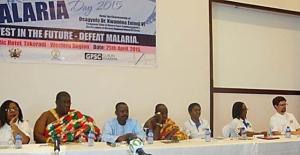Ghana Commemorates World Malaria Day
Ghana commemorated World Malaria Day on 25 April in Takoradi, Western Region, under the theme, “Invest in the future: Defeat Malaria” Speaking at the function, Dr Gloria Quansah-Asare, Deputy Director-General of the Ghana Health Service (GHS), disclosed that Ghana has made significant progress in the fight against malaria over the past two decades as evidenced in the Ghana Demographic Health Survey (GDHS) 2014.
According to her, routine health facility data in 2014 showed that deaths due to malaria reduced by 35% from 3,256 in 2011 to 2,200 in 2014, and case fatality rate in under five children was 0. 51% as compared to 14% in 2011. She added that the 2014 GDHS also put ownership of insecticide treated bed nets in Ghana at 68 per cent, an increase over the 2003 GDHS figure of 18%.
Dr Quansah-Asare emphasized that Western Region is one of the three regions of the country with the highest prevalence of parasitaemia. This means that 36 out of 100 children under five years had the malaria parasite in their blood, she said. Furthermore, one of the reasons for commemorating the day in the Western Region was the Mass Long Lasting Insecticidal Bed Nets (LLIN) Point distribution, to take place in the region in May this year. She reiterated the fact that Ghana must accelerate the campaign against malaria in line with Millennium Development Goal (MDG) 6 and to ensure attainment of MDGs 4 and 5, more resources was needed for malaria control and therefore called on all to support the effort to establish a Malaria Fund to help increase financial resources for malaria control, and to help meet obligations for counterpart financing of malaria interventions.
Dr. Keziah Malm, Acting Programme Manager of the National Malaria Control Programme (NMCP), gave highlights of some malaria control interventions as outlined in their five-year strategic plan. She mentioned that programme would begin a pilot project of the distribution of a new malaria prophylaxis in all districts of the Upper West Region. She was however not happy that malaria in the Western Region had increased, saying in the past, the Upper West, Upper East and the Northern Regions, had high incidence of the disease. She added that Illegal mining/”Galamsey” activities in the region had left big trenches which had become the breeding places for mosquitoes, adding that “galamsey” operators must use the right processes in order not to create more breeding sites for mosquitoes.
Dr Malm indicated that prompt and effective treatment was necessary in controlling malaria, and reducing deaths resulting from the disease. “All cases must be subjected to diagnostic test before treatment, because in most instances any febrile conditions is diagnosed and treated as malaria which is not right” she added.
Speaking on behalf of all Partners, Dr Sally-Ann Ohene, Disease Prevention and Control (DPC) Officer at World Health Organization (WHO) Ghana, , said malaria could be prevented or controlled through the use of LLINs, and called for massive participation in LLINs Point Distribution in the Western Region.
She said increased malaria funding was needed in order to save lives, and further expand access to malaria prevention, diagnosis and treatment services in the country. She further indicated that more funds were urgently required to make effective tools already in existence available to address emerging issues, such as drug and insecticide resistance as there was a global consensus to reduce malaria mortality and incidence rates by at least 90 per cent by 2030 and eliminate malaria.
“We the partners of Ghana on our part will continue to provide financial support and evidence-based guidance to all countries and stakeholders to better target malaria interventions, strengthen national health systems towards universal health coverage and accelerate progress towards a malaria-free Africa”, Dr Ohene said.
Mr. Alfred Ekow Gyan, Deputy Western Regional Minister, said deaths due to malaria among pregnant women and children had reduced drastically as a result of the adaption of a multi-pronged strategy which includes Insecticide Treated Nets (ITNs), indoor residual spraying, compliance and adherence to the treatment of malaria as well as frequent public education and creation of awareness on public health issues.
Osagyefo (Dr) Kwamena Annimil VI, President of the Western Regional House of Chiefs and Omanhene of Wassa Fiase Traditional Area who presided, pledged the support of the Regional House of Chiefs and his traditional area for the country's malaria programme.
National Malaria Control Programme/Ghana Health Service/Ministry of Health and partnering organizations have invested in malaria control efforts by distributing over 12 million LLINs from 2010 to 2012 through door to door distribution and hang up campaigns. With the 3 year life span of an LLIN, the programme /GHS has instituted a replacement campaign dubbed, “Mass LLINs Point Distribution Campaigns” and has implemented this in Eastern and Volta Regions in the last quarter of 2014.
____________________________________________________
For additional information, please contact:
Technical Contact:
Dr Magda Robalo; Tel +233 302-763918 Email: robalom [at] who.int (robalom[at]who[dot]int)
Dr Felicia Owusu-Antwi: Tel+233 244311172 Email: owusuantwif [at] who.int (owusuantwif[at]who[dot]int)
Media Contact:
Michelle Thulkanam: Tel +233-(0)50-565-7754 Email: thulkanamm [at] gmail.com (thulkanamm[at]gmail[dot]com)-
Ms Joana Ansong: Tel: +233 544316017 Email: ansongj [at] who.int (ansongj[at]who[dot]int)



